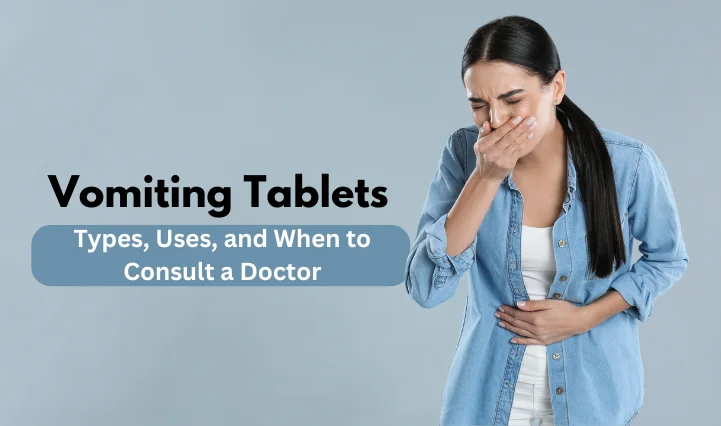Vomiting Tablets: Types, Uses, and When to Consult a Doctor
A person can suffer from Nausea and vomiting due to a wide range of reasons. The reasons can range from food allergies to cancer or a tumor. While vomiting tablets can help manage the symptoms, it is necessary to consult a doctor and understand the root cause of the problem.
What Causes Vomiting
Some of the medical conditions that can trigger nausea and vomiting are –
- Food allergies
- Infections such as food poisoning and other diseases regarding the stomach.
- Leaking of stomach contents (food or liquid) upward. It is also known as acid reflux.
- Medical procedures such as cancer chemotherapy or radiation treatment
- Migraine headaches
- Morning sickness during pregnancy
- Seasickness or motion sickness
- Severe pain, such as with kidney stones
In some cases, nausea and vomiting can also be a sign of other serious diseases as well. In these scenarios, nausea and vomiting will be complemented along with other symptoms such as pain and fever. Some of these serious causes for vomiting include –
- Appendicitis
- Blockage in the intestines
- Cancer or a tumor
- Ingesting a drug or poison, especially by children
- Ulcers in the lining of the stomach or small intestine
Questions A Doctor May Ask Before Giving Vomiting Tablets
At a clinic or a hospital, may ask the following types of questions:
- When did the vomiting start? How long has it been happening? When is it happening?
- Does it happen on an empty stomach or after a meal?
- Are you experiencing any other symptoms such as headache?
- Is there blood in your vomit?
- Does your vomit look like coffee grounds?
- Are there any solid pieces of food in your vomit?
- When did you last urinate?
- Have you been losing weight?
- Have you been traveling? Where?
- What medicines do you take?
- Did other people who ate at the same place have the same symptoms?
- Are you pregnant or could you be pregnant?
Diagnostic Tests that May be Performed Include:
- Blood tests
- Liver Function test
- Urinalysis
- Imaging studies (ultrasound or CT) of the abdomen
Different Types of Vomiting Tablets
There are options to treat vomiting. These options consist of prescription, over-the-counter, and natural remedies.
Non- Prescription (Over the counter) Vomiting Tablets
1. Domperidone (Motilium) – Helps with nausea and bloating.
2. Meclizine (Bonine, Antivert) – Used for motion sickness.
3. Dimenhydrinate (Dramamine) – Besides vomiting, it is also given for nausea and vomiting.
Prescription Vomiting Tablets
- Ondem syrup is primarily used to treat nausea and vomiting in children.
- Vonoprazan is primarily used to treat non-erosive gastroesophageal reflux disease (GERD), also known as non-erosive reflux disease (NERD). Some of the symptoms of this disease are nausea and vomiting
- Rabeprazole sodium and domperidone capsules are sold under the following brand names in India
- Robo DSR Capsule 10’s
- RxBuy Neutral-DSR Capsule 10’s
- Neutral-DSR Capsule 10’s
- RxBuy Altop DSR Tablet
- RxBuy Odirab-D Capsule 15’s
- RxBuy Rabesys-D Capsule
- RxBuy Nuloc-D Capsule
Natural Remedies For Vomiting
Ginger tea or chewing on ginger helps treat mild nausea. Another option is Peppermint as it soothes Nausea.
Important Note: If the nausea is persistent, consult a doctor as soon as possible.
Some Generic Precautions for Anti-Vomiting Tablets
The precautions are as follows:
- Take with water and as directed.
- Do not overdose.
- Consult a doctor if the symptoms persist for more than two days.
- Do not combine it with alcohol or sedatives.
- People should not take these medications with liver, kidney or heart issues.

